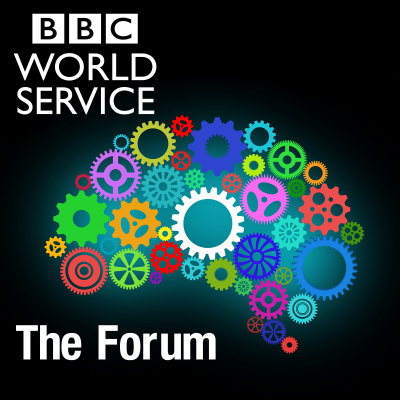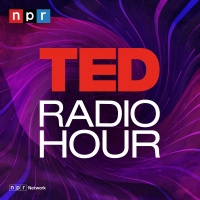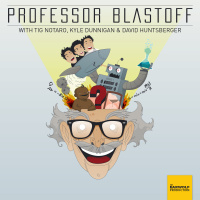Sinopse
A world of ideas
Episódios
-
The invention of numbers
30/06/2018 Duração: 39minTry and imagine a world without numbers. Telling people how many siblings you have, counting your wages or organising to meet a friend at a certain time would all be much more difficult. If you’re reading this on a digital screen, even these words are produced through a series of zero and one symbols. We take them so much for granted yet some cultures don’t count and some languages don’t have the words or symbols for numbers. This programme looks at when and why humans first started start to count, where the symbols many of us use today originate from and when concepts like zero and infinity came about. Joining Bridget Kendall to explore the history of numbers and counting are anthropological linguist Caleb Everett from the University of Miami, writer and historian of mathematics Tomoko Kitagawa, and Emeritus Professor of Mathematics at Warwick University in the UK, Ian Stewart.Photo: An abacus on a table.(CaoChunhai//Getty Images)
-
The life and works of William Blake
23/06/2018 Duração: 38minWilliam Blake is now one of England’s best-loved poets and artists, associated with the well-known poem “The Tyger” and the hymn “Jerusalem”, regularly coined England’s unofficial national anthem. But in his time he was an eighteenth century radical visionary who challenged the social order as well as political and religious orthodoxy at every turn. He was even tried for sedition. Rajan Datar discusses his life, works and remarkable legacy with Blake experts Dr. Linda Freedman, Dr. Susan Matthews, Prof. Jason Whittaker and artist Michael Phillips.Photo: 'Newton' by William Blake (Bettmann Collection)
-
J. William Fulbright: Scholarships and Soft Power
16/06/2018 Duração: 39minIn many countries, the word 'Fulbrighter' has become almost synonymous with US-sponsored scholarships. But what about the man whose idea it was to set up this international scholar exchange programme over 70 years ago: how did J. William Fulbright convince his fellow Senators to support this novel concept? After all, the aims of the programme were nothing if not ambitious: "the achievement in international affairs of a regime more civilized, rational and humane than the empty system of power of the past".To discuss the history of the Fulbright programme, Bridget Kendall is joined by Fulbright's biographer Randall Woods, Professor of History at the University of Arkansas; Joan Dassin, Professor of International Education and Development at Brandeis University in Massachusetts; and two recent Fulbright scholarship recipients: language teaching specialist Vitoria Prochet from Brazil and human rights activist from Afghanistan Nilofar Sakhi.Historic recordings of Fulbright speeches used in the programme courtesy o
-
The tales of Timbuktu
09/06/2018 Duração: 38minThe fabled city of Timbuktu is a curiosity. To 16th century Muslim scholars, it was the cosmopolitan hub of Islamic learning in West Africa; to European explorers 300 years later, it was a place of mystery, whose name remains synonymous with being at the end of the Earth. Most recently, in 2013, Timbuktu was at the centre of the world's attention again, after Islamist militants threatened thousands of valuable historic manuscripts stored in the city's famous libraries. Believed to be the richest person in history, it was Mansa Musa - the emperor of the vast Mali Empire - who first developed the desert settlement into a place of intellectual debate in the 1300s. The golden age of Islamic learning he began still survives today. Joining Bridget Kendall to discuss the importance of Timbuktu in Islamic history are Dr. Gus Casely-Hayford, director of the Smithsonian National Museum of African Art in Washington, D.C., who has recently published a Ladybird Expert book about the city; Dr. Susana Molins-Lliteras, a res
-
The piano: Hitting the right keys
02/06/2018 Duração: 39minWhat’s the secret to the 300 year-old success of the piano, an instrument that was hardly a huge hit when it was invented around the turn of the 18th century?Perhaps it’s the ability of the instrument to convey a vast range of styles from singing melodies to percussive rhythms, and from classical music to jazz, rock and pop. With the help of musical examples, Bridget Kendall and guests will explore how the piano has inspired music from composers on every continent.Joining Bridget will be the historic keyboard specialist Dr Elena Vorotko from the Royal Academy of Music in London, pianist and author Professor Kenneth Hamilton from the University of Cardiff, and the writer Stuart Isacoff in New York.Photo: Piano keys (Getty Images)
-
Simone de Beauvoir: Feminist thinker for modern times
26/05/2018 Duração: 39minSimone de Beauvoir was a French philosopher and writer whose work exploring what it is to be a woman shaped feminist thinking today. A pioneering intellectual, she used her existential ideas around freedom and responsibility to shape her life, literature and politics. Rajan Datar discusses her life and work with writers Claudine Monteil and Lisa Appignanesi, and philosopher Tove Pettersen.Photo: Simone de Beauvoir (Getty Images)
-
Catherine the Great of Russia
19/05/2018 Duração: 40minFamous for her lovers and satirised for her colourful personal life, Catherine the Great was in many ways one of Russia’s most progressive and moderate rulers, modernising 18th century Russia, improving educational standards and creating a flourishing arts and literature scene. But she also turned Russia into the biggest Empire on earth since the Roman Empire, which included the annexation of Crimea. So how far has her imperial mind set influenced Russia’s modern rulers, like President Putin? Joining Bridget Kendall to discuss the life and legacy of Catherine II of Russia, is Professor Andrei Zorin, cultural historian and Chair of Russian at the University of Oxford, Simon Dixon, Professor of Russian History at University College London and author of the biography “Catherine the Great”’ and Dr Viktoria Ivleva, who specialises in Catherine’s role as a woman ruler and her use of uniform and costume.Photo: Equestrian Portrait of Catherine II. Oil on canvas by Vigilius Eriksen, Denmark. After 1762 (The State Herm
-
Material World: Making the Modern Factory
12/05/2018 Duração: 39minBridget Kendall and guests discuss the key components of the global story of the factory, tracing its development from eighteenth century Britain to twenty-first century China and beyond. Exploring how the factory came to shape not just the material world but entire social worlds too, they share their expert knowledge on topics such as the lives of factory workers, the capitalist and communist factory, and the changing face of manufacturing in an age of robots and smart technology.Bridget is joined by Joshua B. Freeman, Martin Krzywdzinski, Alessandra Mezzadri and Nina Rappaport. The sociologist Ching Kwan Lee also shares her insights into factory life in Shenzhen as it transformed in the late twentieth century.Image: Illustration of an old 18th century factory. (Hulton Archive/Getty Images)
-
Machu Picchu: The secrets of a forgotten city
05/05/2018 Duração: 39minThe ancient Inca town Machu Picchu is now the most visited tourist attraction in Peru - and yet it lay nearly forgotten for over three centuries until American and Peruvian explorers drew the world's attention to it in the 1910s. And despite a century of excavations at the site, there are still many unanswered questions about Machu Picchu: why was it built in the first place, who were the immigrants that made up a large proportion of the town's population and why was it abandoned so quickly.To find out more about Machu Picchu, Bridget Kendall is joined by leading archaeologists of the Inca civilisation Lucy Salazar and Michael Malpass, the celebrated mountaineer and explorer Johan Reinhard and by writer Mark Adams who retraced the steps of the 1911 expedition led by Hiram Bingham that put Machu Picchu back on the map.(Photo: Machu Picchu, Peru. Credit: Eitan Abramovich/Getty Images)
-
Plastic: How it Changed the World
28/04/2018 Duração: 39minThe birth of modern plastic began in 1907 with the invention of Bakelite, one of the first plastics to be made from entirely synthetic components. But plastic in a particular form was being used many thousands of years ago by the Olmec, the earliest known civilisation in Mexico, who played with balls made of a natural polymer - rubber. Over the years the plastics industry has grown from the work of a handful of inventors to a global player whose products reach into almost every corner of our lives. Plastic has been at the heart of one of the most important changes in virtually all societies since the second world war: the consumer revolution. But while it is a force for good in many areas and a highly versatile material that appears in the most surprising places, plastic today is a major environmental preoccupation. Can we modify our use towards this wonder material, or can scientists rise to the challenge of creating a plastic that will break down completely when it has reached the end of its useful l
-
Sugar: A Sweet Menace
21/04/2018 Duração: 40minRarely has one foodstuff had such global influence as Sugar – on our trade and economy, movement of people around the world, and health and treatment of fellow humans. Once a costly luxury called “white gold”, it was pivotal in one of mankind’s most shameful chapters – slavery. Joining Rajan Datar to find out more about Sugar and its connection with power is the Canadian historian Dr Elizabeth Abbott, the writer Marina Budhos whose Indian background inspired her research, and the Columbian political scientist Dr Eduardo Gomez, author of ‘Geopolitics in Health’.Photo: A sugar bowl (Getty Images)
-
What is Zoroastrianism?
14/04/2018 Duração: 40minIt is a religion that has lasted three millennia, claims to be the world's first monotheistic creed and to have influenced major faiths such as Christianity, Judaism and Islam, inspired artists from Voltaire to Freddie Mercury but Zoroastrianism may be heading for extinction: in some communities only children of male Zoroastrians are admitted to the faith and there are probably fewer than 200 thousand left now. Rajan Datar talks about the history of Zoroastrianism with Dr. Sarah Stewart, Shapoorji Pallonji Lecturer in Zoroastrianism at SOAS, University of London, Malcolm Deboo, President of the Zoroastrian Trust Funds of Europe, the oldest Zoroastrian organisation on the continent, and Yuhan Vevaina, professor of Sasanian Studies at Oxford University.Photo: Faravahar - relief of winged sun symbol of Zoroastrianism in Persepolis city, Iran. (Getty Images)
-
Votes for Women: the Global Story
10/04/2018 Duração: 40minIt was exactly a hundred years ago that women in the UK won the right to vote: though at first it was only for property owning women over thirty. But Britain wasn’t the trail blazer. Seven countries were ahead of it including two of its colonies. So what were the deciding factors? Was it the changing circumstances created by wars and the collapse of Empires? Or was it the suffragettes’ sometimes violent tactics? And why did Switzerland take as long as 1971 to enfranchise women? Joining Bridget Kendall to look at the global story of how women got the vote is the Indian social scientist Nikita Sud, Jad Adams the author of “Women and the Vote”, and Lindie Naughton the biographer of the first woman elected to the British parliament Constance Markievicz.Photo: Women voting (Reuters)
-
From Straw Poll to Opinion Poll
30/03/2018 Duração: 39minToday, we can’t imagine an election without an opinion poll gauging public opinion on who’s leading, who’s won a debate or who’s more popular with a specific group of voters. Even our favourite chocolate bars and footballers are subject to a poll. But how did straw polls evolve into the scientific number crunching we know now? What is their purpose and impact? How differently are they used around the world? And just how reliable are they?Bridget Kendall is joined by economist and chairman of Gallup Pakistan Dr Ijaz Shafi Gilani; Scott Keeter, senior survey advisor for the Pew Research Center in Washington; and Sir John Curtice from the University of Strathclyde.Picture: American President Harry S Truman smiles and waves to the excited Kansas City crowd after hearing the news that he had won the United States elections in 1948 and retained the Presidency, despite of what many polls had predicted, Credit: Keystone, Getty Images.
-
Lawrence of Arabia
24/03/2018 Duração: 39minT.E Lawrence was a British scholar and adventurer whose involvement with the Arab Revolt during the World War One inspired one of the most celebrated films in cinema history. So how did a man who was offered a knighthood and became an international celebrity end his days in near obscurity? Bridget Kendall is joined by historians James Barr and Juliette Desplat, and writer Scott Anderson to discuss his life and legacy.Photo: T. E. Lawrence. Photo by Hulton Archive / Getty Images.
-
Yves Saint Laurent: Fashion revolutionary
17/03/2018 Duração: 39minIn the ten years since his death, the impact of designer Yves Saint Laurent on women’s fashion remains undimmed. The pea coat, the trench, the trouser suit – many of his designs are now staples of the modern Western woman’s wardrobe. So how did this famously shy and retiring man achieve global success? And did his fashion innovations for women shape social change in the 1960s, or were they a response to his times? Bridget Kendall looks back at Saint Laurent’s life and legacy with director of the Yves Saint Laurent Museum, Olivier Flaviano, fashion historian Emilie Hammen and one of Saint Laurent’s last assistants, designer Charles Sébline.Photo: Yves Saint Laurent, French designer, with two fashion models, Betty Catroux (left) and Loulou de la Falaise, outside his 'Rive Gauche' shop. Credit: John Minihan, Getty Images.
-
Herman Melville: Moby Dick
10/03/2018 Duração: 39minMoby Dick is the story of a crazed and vengeful sailor, Captain Ahab, hunting a giant whale that bit off his leg. It's a large and challenging book and its author, Herman Melville died without knowing how influential or revered it would become. Although it failed to impress when it first came out in 1851, it’s now hailed as a ‘great American novel’, one of the towering achievements of American literature. With Bridget Kendall to explore the book and its author, Professor Jamie Jones from the University of Illinois, Emily Ogden from the University of Virginia and poet and academic from Lancaster University in the UK, Paul Farley. Photo: Sperm Whale (Martin Camms/Getty Images)
-
The original Goths
03/03/2018 Duração: 39minThe Goths were a Germanic tribe infamous for their brief sack of Rome in 410 AD, but their cultural and political influence was felt throughout Europe for centuries. They re-shaped the Balkans, preserved the Roman way of life in Italy, and presided over a cultural flourishing in Spain. But how, many centuries after their demise, did they come to give their name to an important architectural style in medieval Europe and, in the 20th century, to a subculture popular all over the world?Bridget Kendall talks all things Gothic with David Gwynn, historian at Royal Holloway, University of London, and author of Goths, the Lost Civilisation. Also on the panel are Janina Ramirez, a cultural historian, broadcaster and author who focuses on the Middle Ages, based at the University of Oxford, and Mischa Meier, professor of ancient history at the University of Tubingen in Germany.(Photo credits: Goth girl - BBC, Gothic King Theodoric coin - Mark Cartwright)
-
Dante’s Inferno: The poetry of Hell
24/02/2018 Duração: 40minInferno is the 14th century epic that tells the story of Dante Alighieri’s imaginary journey through the underworld. It is the first part of Dante’s The Divine Comedy, and is widely considered to be one of the world’s greatest poems. “Abandon all hope you who enter here” is the famous phrase inscribed on the gates of Dante’s Inferno, and Hell is divided into nine circles, with cruel and unusual punishments afflicting the sinners, who range from the lustful and cowardly in the upper circles to the malicious at the bottom of Hell. Joining Rajan Datar to explore Dante’s Inferno is Dr Vittorio Montemaggi, author of Reading Dante’s Commedia as Theology; Claire Honess, Professor of Italian studies at the University of Leeds, and Sangjin Park, Professor of Italian at Busan University of Foreign studies in South Korea, who will be speaking about the role Inferno played in shaping Korea’s national identity.Photo: A visual interpretation of red hell-fire (Getty Images)
-
Magellan: First Man Round the Globe?
17/02/2018 Duração: 39minPortuguese sailor and explorer Ferdinand Magellan set out 500 years ago to find a route to the riches of the spice islands, north east of present day Indonesia. Through a series of adventures and tragedies, Magellan’s voyage discovered the Straits of Magellan joining the Atlantic and Pacific oceans through Southern America and was the first expedition to completely circumnavigate the World. But Magellan died on the way and the remaining crew were in fact first round the globe. To explore an achievement that changed the World and still influences us today, Bridget Kendall is joined by Dr Rodrigo Cacho, Dr Alison Sandman and Dr Rachel Winchcombe.Photo: An illustration of Ferdinand Magellan (Hulton Archive/Getty Images)










